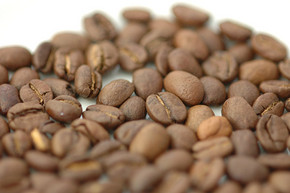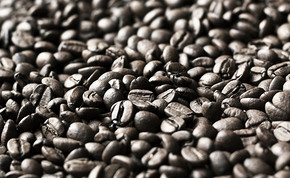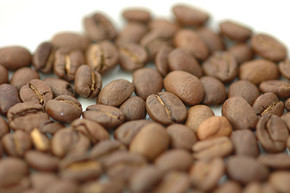Arabica coffee beans? introduction to Arabica coffee beans
Follow the caf é (Wechat official account vdailycom) and found that Beautiful Cafe opened a small shop of its own.
Arabica coffee is a coffee plant native to Yemen and Ethiopia. The coffee beans produced by this plant are one of the best varieties in the world. Compared with coffee beans from South American countries, many people prefer the aroma and taste of the coffee beans. In addition, Arabica coffee beans contain relatively little caffeine.
In order to produce high-quality coffee beans, Arabica coffee plants usually take seven years to mature. This plant is best suited for growing in shady areas for most of the day. This is obviously different from other coffee varieties that require a lot of direct light to thrive.
Unlike many coffee plants, Arabica coffee trees can be grown at a wide range of elevations, even below sea level. Altitude is not a major factor in the growth of this plant, but the amount of rainfall accepted is more important. Generally speaking, 40 to 59 inches, or one meter to one and a half meters of rainfall is the best during the growing season. Although this plant is more tolerant to low temperatures than some other coffee varieties, the most suitable temperature for Arabica coffee trees is 20 degrees Celsius.

Arabica coffee is very popular in the Arab region because of its special taste. In recent years, the coffee has also entered the market in countries such as the United Kingdom, the United States and Canada. Although the taste is mellow, Arabica coffee is not bitter (especially freshly brewed). Like many types of coffee, bagged Arabica beans or powdered coffee are available on the market.
For people who like coffee but care about caffeine content, Arabica coffee offers an alternative to decaffeinated coffee, which uses chemical processing to get rid of caffeine. Although Arabica coffee contains a little more caffeine than most decaffeinated products, the reduction is enough for coffee lovers to relax and enjoy the drink. In addition, you don't have to worry about not sleeping at night to drink this kind of coffee after dinner.
Arabica is deeply loved by Chinese people with a short history of coffee contact because of its strong fruity aroma. it was introduced to China by missionaries in the 19th century and widely planted in Panzhihua, Sichuan, and the dry-hot valley of the Jinsha River above 1000 meters in western Yunnan. The sunshine in this area lasts for a long time and there is a great temperature difference between day and night. The local people solve the problem of insufficient seasonal rainfall by diverting water up the mountain, resulting in a unique aroma of "Chinese coffee". Among them, Banpo coffee grown in Arabica in Panzhihua, Sichuan is the most. Compared with Yunnan and Hainan, Panzhihua in the dry-hot valley has longer sunshine, higher altitude, greater temperature difference, good light quality and more virgin land. it is a rare and most suitable area for growing Arabica coffee. Banpo coffee farmers take advantage of this advantage to adopt unique planting and processing technology: first, "do not land on the ground": from collecting coffee beans to processing into finished products, coffee has been kept free from soil and other sundries to ensure its taste and quality; second, "graded collection": since coffee beans are not uniform and mature, coffee beans of the same level are collected centrally rather than mixed together. Such as manual operation, the use of a large number of labor force to collect, classify and process. The coffee here has a rich aroma, bitter balance and fruit flavor, which is very popular with consumers and foreign coffee beverage giants.
Important Notice :
前街咖啡 FrontStreet Coffee has moved to new addredd:
FrontStreet Coffee Address: 315,Donghua East Road,GuangZhou
Tel:020 38364473
- Prev

Introduction of 100% Arabica Coffee beans in KFC freshly ground Coffee
Following Cafe (official Wechat account vdailycom) found that Starbucks, which runs a small shop of its own, almost dominates fast-food coffee with around 30 yuan. At present, only KFC McDonald's and some convenience stores are in the coffee market of about ten yuan. As KFC's store location is very advantageous, this line is opened in the stage of coffee popularity for coffee in the future.
- Next

What's the difference between Arabica coffee and Roberta coffee?
Following caf é (Wechat official account vdailycom) found that Beautiful Cafe opened a small shop of its own. At present, coffee has been grown in more than 50 countries around the world, but good coffee beans are mainly produced in the equatorial zone between 25 degrees north latitude and 30 degrees south latitude, high altitude, tropical climate and fertile soil. Only in this way can we grow quality coffee beans with full particles and rich coffee flavor. Full
Related
- Detailed explanation of Jadeite planting Land in Panamanian Jadeite Manor introduction to the grading system of Jadeite competitive bidding, Red bid, Green bid and Rose Summer
- Story of Coffee planting in Brenka region of Costa Rica Stonehenge Manor anaerobic heavy honey treatment of flavor mouth
- What's on the barrel of Blue Mountain Coffee beans?
- Can American coffee also pull flowers? How to use hot American style to pull out a good-looking pattern?
- Can you make a cold extract with coffee beans? What is the right proportion for cold-extracted coffee formula?
- Indonesian PWN Gold Mandrine Coffee Origin Features Flavor How to Chong? Mandolin coffee is American.
- A brief introduction to the flavor characteristics of Brazilian yellow bourbon coffee beans
- What is the effect of different water quality on the flavor of cold-extracted coffee? What kind of water is best for brewing coffee?
- Why do you think of Rose Summer whenever you mention Panamanian coffee?
- Introduction to the characteristics of authentic blue mountain coffee bean producing areas? What is the CIB Coffee Authority in Jamaica?

